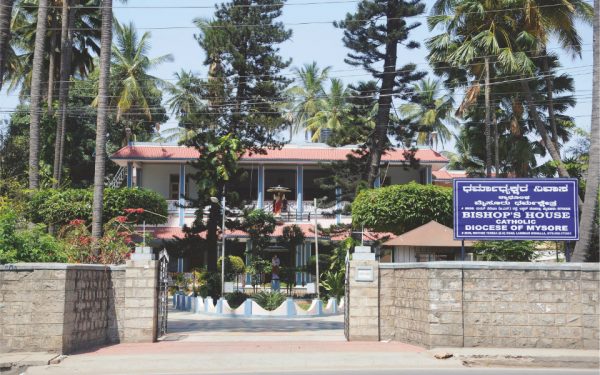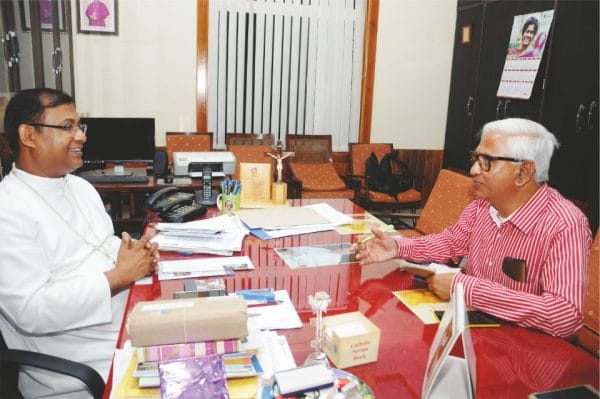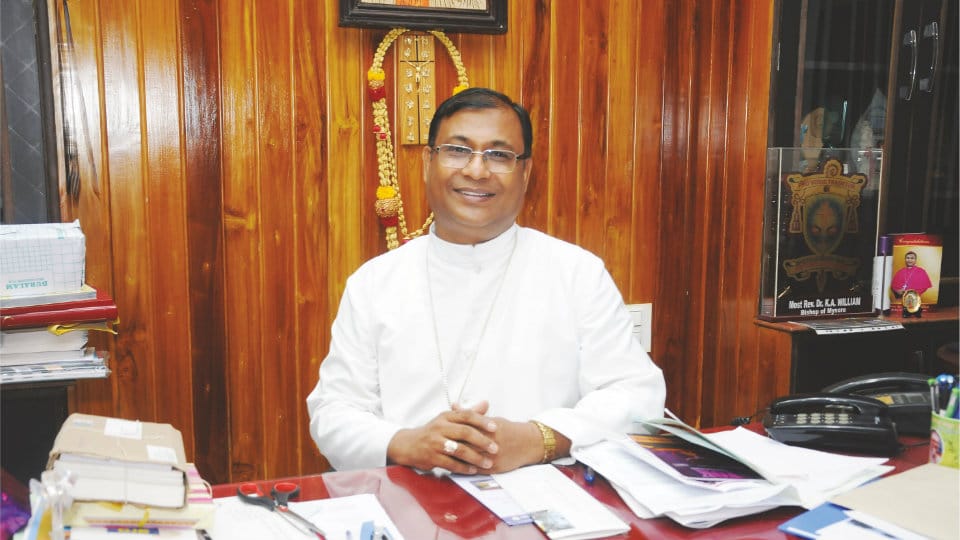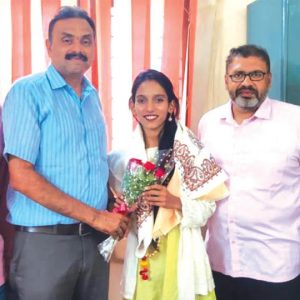on the Making of a Bishop, Role of the Church and his Love for Mysuru…
With the gates open, there is a feeling of warmth and welcome as one drives into the Bishop’s House on Bengaluru-Nilgiri (BN) Road. It is exactly a week after the Consecration (February 27, 2017) that Star of Mysore caught up with a relaxed looking new Bishop Rev. K.A. William with the cherubic face, at his well-kept spartan office. In this exclusive interview to SOM, the Bishop, who spoke what a man of God should be, shared about what goes into the making of a Bishop, the role of the Church, his love for Mysuru, the importance of education and the many challenges he has in the days to come. Excerpts:
By N. Niranjan Nikam, Senior Journalist
Star of Mysore (SOM): Rev. William, the Consecration on February 27, 2017, which also happened by coincidence to be your mother’s and your birthday, was very well organised and well-attended. It is said that it was one of the best Ordinations in a long time. What goes into the making of a Bishop?
Bishop William: Actually, it is the Vatican, which has everything to do with the making of a Bishop. Finally, it is the Holy Father on whose behalf there is a team which does the selection. We have an Apostolic Nuncio who is the Ambassador of Vatican State and a representative of the Holy Father. He has a dual role as a representative of a tiny State, he represents India that is for the political side. For us Catholics, he is the representative of the Holy Father of the Indian Catholics. The new Apostolic Nunciature is Most H.E. Most Rev. Giambattista Diquattro.
They have a team of people who first begin the process of selection. Their immediate superior Diecastry (congregation) the Propaganda Fide (Propagation of faith) are accountable to the Holy Father. In Delhi, they gather information about several candidates of all the Diocese in India. They finalise the list and we do not know anything about this. No one can lay claim to Bishophood. It is purely their search and hence no influence or unwanted elements trying to push their candidates can work. It is purely the decision of the Holy Father in the Vatican.
And it is all done in secrecy. No one will know until it is communicated to the candidate. Of course, people can spread rumours. But absolute secrecy is maintained till the final outcome is known.
SOM: At 52, you are one of the youngest Bishops. How confident are you holding your own against much elder clergy?
Bishop William: I am not one of the youngest Bishops. In fact the Most Rev. Rene Feuga, the first Bishop of Mysore, was 48 when he was ordained. In the early 1960s, there was a Bishop who was less than 40. Even now there are other Bishops in the Diocesan world at large who are younger than me.
We are blessed to have several clergy in Mysore Diocese who have contributed a lot for the good of the Diocese. I always want to walk along with them, get strength and guidance from their good experience and this I have done in the past.
When I was the Financial Administrator in 2003, I was really young and all of them co-operated and were very encouraging. In 2009, as the Parish Priest of St. Philomena’s Church I could do a lot with the blessings of the elders and I believe the same will be continued. I also take it as a strength as I am from the same Diocese and hence all the priests and places are familiar.

SOM: Once you were ordained, you spoke with a great deal of clarity and thought. What gave you the strength to be so calm and composed?
Bishop William: See, when I was consulted by the Vatican through the Nunciature, whether you would take up the Office, they asked me. I took one full day. They had called me on Jan. 17. It is a great responsibility and I do have lots of challenges to face. But the thought that struck me the most to accept is, I am under obedience to the Holy Father, the Pope’s faith. It is that obedience that he has decided to appoint me, and that is what made me respond to his decision.
Hence, the two most important reasons were the obedience on my part and the trust reposed in me is what made me consider to serve or to accept and that is why I am here today.
SOM: Can you share your student days as you did your schooling, college, seminary in Mysuru, in that way a true-blooded Mysurean?
Bishop William: I love Mysuru because this is where all my formative years were spent. I was born in Polibetta (Kodagu) as my mother came from there. My father served in the postal department in Mysuru and hence as a child, I came and settled here. My schooling was in Good Shepherd Convent and then at St. Mary’s which is located in St. Philomena’s Church premises. I moved to St. Philomena’s High School and then did my PU in St. Philomena’s College. These are my educational centres.
I could always get good academic exposure and pursue various other activities too. The friends from my childhood also helped me grow. Even later, when I became the Manager to St. Mary’s and St. Philomena’s institutions, I was really proud that they were my institutions and that made me give a little more attention to these institutions.
I studied MA in Christianity in University of Mysore. The department then was in an old building. The library and the Manasagangothri campus were very lively and beautiful. I was in the nearby Hinkal Church, a new Parish then where I was the priest. Hence, I could combine my work and study together and they are really fond memories.
SOM: What about the Seminary studies?
Bishop William: It is a very important place for our formation to be the future priests. I studied at St. Mary’s Minor Seminary in Mysuru for three years and then in St. Peter’s Seminary at Bengaluru for seven years. I entered the Seminary after my SSLC.
The very word Seminary means ‘seeds sprouting.’ This is where each student develops roots and then sprouts. In Bengaluru we did studies in Philosophy and Theology, which helps in the total formation of a priest academically, spiritually and pastorally. We are given a lot of opportunities to grow to be the future priests. The best part is we had students from several Dioceses, including students from Andhra Pradesh, Kerala, Tamil Nadu and Karnataka. We all studied and played together. It was a multi-cultural environment. There were more than 200 students.
SOM: Being appointed by the Pope in the Vatican is the high-point in any priest’s life. What went through your mind when the letter from the Pope came on January 25?
Bishop William: As I told you earlier, I had to first give my acceptance which I had done. The Pope Francis made the announcement at 12 noon in the Vatican while at the same time our former Bishop Most Rev. Dr. Thomas Anthony Vazhapilly made the announcement at 4.30 pm Indian Standard Time.
SOM: Were there many other Bishops’ names announced on that day?
Bishop William: Sometimes there are many names announced. But this time only two were announced. One was of a Bishop from a South American Diocese and the other one was mine.
I must tell you something very important here. After the consultation and acceptance, I am bound once again by the Pontifical Secret. I cannot go and tell anyone, including my fellow priests or my family about my appointment. Even Bishop Vazhapilly will not know. Once he comes to know he is also bound by the Pontifical Secret. Even he is not supposed to tell anyone. Once the obedience and trust is given is the time when the Christian faith takes priority.
SOM: What was the feeling like?
Bishop William: It is a mixed feeling that I went through. I was happy that I have been recognised. But on the other side, I am also aware of the responsibilities which is going to be very tough. Because I have to look at all sides whether it is spiritual, educational, social or medical. I am also in charge of four districts — Mysuru, Mandya, Chamarajanagar and Kodagu. Mysore Diocese is one of the oldest in Karnataka. There is a good tradition here. My predecessors have contributed a lot and the priests and the laity (people) have all given their support. However, things are changing and we have to adjust to the times and live in today’s world.
SOM: With so much of turmoil in the world today and each major religion claiming to gain superiority, what is the role of the church in improving mankind?
Bishop William: Right from the beginning our Founder Jesus Christ came up with an utterly simple concept which said in two words — “Salus Animarum” — Salvation of Souls. This is the crux of the Christian faith, the Church has no other mandate from Christ. Even healing the sick, delivering men from demonic possession, and all that He taught in the Sermon on the Mount were means only to the principle end: The Salvation of the Soul. Christ Himself emphatically asks:
“What does it profit a man to gain the whole world, and lose his own soul?” (St. Matthew 16.26).
But in today’s world apart from the salvation of the soul and spiritual quest, also there are other things a human being needs. The Church has always focused on education, social and medical needs of the human being. We believe that along with spiritual needs man also needs material support and if both body and mind are taken care of then everything falls into place. We believe that if a person gets a good education, then one’s family, the village, the society at large is benefited. And I am happy to tell you that in India at large and in our own Diocese we have attained it.
Yet we are a population of less than two per cent, which means to say our service to humanity is reflected in spite of whatever religion they belong to. This perhaps is forgotten, but there is instead accusation against us. To us the other religions are not a threat at all. In fact, we consider the pluralism and the good tradition of them enrich us. It is beautiful and the support thus received when they have human values enhances everyone’s life.

Niranjan Nikam interacts with Bishop Rev. K.A. William.
SOM: Bishop, you have curiously talked about protecting Church properties and also say that a committee has been set up to look into it. Why do Church properties need to be protected?
Bishop William: In today’s context everyone has become so selfish. Large-scale encroachment of our properties and disturbances are taking place. When I say protect it means service for the people. Only when we have the properties that has been there for a long time with us and we protect them can we run the various establishments of the Church. On the other hand, when we give something to the poor and the needy it becomes charity which is what I meant protecting the Church properties.
SOM: You are a multi-dimensional personality. Not only you have worked hard to get funding for the renovation of St. Philomena’s Church from the State Government, but also composed a number of hymns. Share this side of your personality.
Bishop William: When I was appointed in St. Philomena’s Church, the first priority was to protect the Church. The Church is not just for the Catholics, it is the pride of Mysuru and it is for all the people who come here. In short, it is a major tourist attraction. The construction of the Church was started by the first Bishop of Mysore, then a Parish Priest Rev. Rene Feuga in 1933. In 1941, he became a Bishop. The then Maharaja Nalwadi Krishnaraja Wadiyar contributed his mite to the Church. Because of weather and other maintenance issues, the Church came up for repairs. There was a lot of leakage and due to this cracks started developing in many parts of the Church. The Church building is constructed with lime and mortar.
In fact, you will be surprised to know that when we started the inspection, we realised that the tower portions which look so grand from the outside was actually unfinished due to lack of funds. We realised that we needed government support to restore it to its original grandeur. It took a lot of time and effort to keep going to Bengaluru to get funds. It took more than one-and-a-half years and I even became physically sick. But to our joy finally we got the funds sanctioned and in the first phase Rs. 2.5 crore was released. With this we were able to get the leakages and seepages and the wiring work done.
After that in the second phase, both inside and the outside structure had to be strengthened and the government was good enough to sanction another Rs. 2.70 crore and presently the work is going on. As I said earlier, all this is possible because even the public has come out to support the cause in a big way to see that the pride of Mysuru is restored to its original glory.
SOM: What about your interest in music?
Bishop William: It is more because of my personal talent that I have pursued my interest in music. I have composed many Christian religious songs in Kannada which is very popular in Churches. Personally for me this interest in music helps me refresh and it also becomes part of my daily prayer.
SOM: The whole consecration ceremony was conducted in Kannada and even Bishop-Emeritus Dr. Vazhapilly also consecrated you using Kannada language. Why then the opposition from a few Kannada organisations?
Bishop William: I do not know how to say or what to say. Of course, in Mysore Diocese, the prominent services are held in Kannada in St. Philomena’s Church. Karnataka is a multi-lingual State. We have to cater to all sections of the people. However, there are a few people who have their own reasons to protest and I think we do respect their feelings. But personally I have good relations with the public. I was a PRO and my relation goes beyond any religion or language when it comes to human relations. That is the joy I have when I take up this service as a Bishop. People of all faiths had gathered in large numbers during my consecration and Muslims and Hindus had come forward and put up my flexes.
SOM: As a new Bishop and with a long innings ahead, what are the challenges you face?
Bishop William: (Smiles). Long innings depends on the grace of God and good health and further progress and the good work I do all depend on Him. Secondly, in today’s world, as I said earlier the demands are too much and it does not make you feel very comfortable. Today, people are better educated and they have better opportunities to learn and hence we have many called the “intellectuals.” But in reality, and sadly we have much poorer relations than in the past. In the past, there was no education, but better human relations.
We should go beyond religion, caste and creed. Our education should broaden our minds and it should help us become better communicators. But as the wants increase we have become slaves to selfishness. Hence, the co-operation of everyone is needed.
When it comes to the Catholic Church, people do have expectations in the light of my service as a priest and that expectation has made them accept me with joy and happiness. I must emphasise that I cannot do it all alone and it can be done only taking everybody along with me.
Our Diocese is blessed with good educational institutions. There are 136 schools and colleges and after Dr. Vazhapilly took over, a good number of PU and degree colleges came up. Out of the 136 institutions, 100 are in rural areas. We have to provide them a salary and facilities for all of them. Our institutions have transformed many from the rural background by providing them education irrespective of caste, creed or religion and they have been able to stand on their own feet.
My mission is to further strengthen these rural institutions and staff as per the needs of time.
SOM: Many priests among you predict that you could even become a Cardinal sooner or later. Your thoughts on this Bishop?
Bishop William: It is all in the hands of God. I have never thought, sought or wished for positions. I always believe whatever responsibility is given to me, I will do it to the best of my ability. And that will continue. I have no great desire or dream. Better I concentrate on what I have today than what I am tomorrow.





Bishop K A William is down to earth Multi faceted personality who I have known from a very long time. I am sure that his service to the diocese that he represents will be truly enriched in a very selfless way. it will noty be out of context to mention that humbleness in all times and his unbiased approach to issues to which he is subjected has always endeavored him to be liked by one and all.
i am sure there will not be anyone in mysore region who will have a wrong note expressed aganist the Bishop now and in the future. SOM interview has made Mysore proud.
Rev.Msgr.Dr.K.A.William is the right and suitable bishop for mysuru diocese.It is the gift for him with the prayers and genuine spiritual life of his parents.by.James Jayaraj.